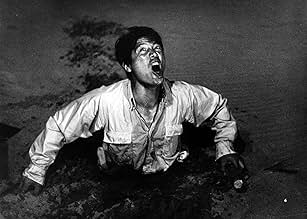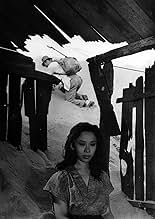Un entomologiste en vacances est piégé par des villageois qui le contraignent à vivre avec une femme dont l'unique fonction est de ramasser du sable pour eux.Un entomologiste en vacances est piégé par des villageois qui le contraignent à vivre avec une femme dont l'unique fonction est de ramasser du sable pour eux.Un entomologiste en vacances est piégé par des villageois qui le contraignent à vivre avec une femme dont l'unique fonction est de ramasser du sable pour eux.
- Réalisation
- Scénario
- Casting principal
- Nommé pour 2 Oscars
- 11 victoires et 3 nominations au total
Avis à la une
A man who is searching for a unique insect in a sandy dessert area ends up trapped in a sandpit where a young woman lives. It becomes apparant that while the man can not escape the woman decides this is her future and that there is little she can do but accept it.
The film is an old black and white film, and many a times it is hard to see what is going on. The story is slow paced, and there is a lot of confusion through much of the film as to why the characters are in this 'unusual' situation. However, I completely got into it and was absorbed by the man who was felt trapped like an animal, and the woman who was accepting of her fate and somewhat comfortable. Also the shots of the dunes are spectacular, the film feels totaly claustrophobic, and it's one of this films which you keep asking yourself every 5 minutes, "How the heck did the film this!?".
But because of its slow nature and somewhat snail pacing and payoff many might not like it. Too bad.
Rating 8 out of 10.
I watched this movie on a Japanese Film Festival in Berlin in 1993. I can't remember all the details but the movie really mesmerized me. It is a very unique work and I wonder why it doesn't have the cult status of other movies.
Niki immediately questions the woman, as to why she would live in such a desolate place, in a ramshackle house where the sand is constantly flowing through holes in the roof and he is amazed to find that her nightly Sisyphean task involves filling baskets with sand that has blown into the pit and having it hoisted up by the locals. After feeding him, the woman tells him he doesn't have to help on his first night here, he finds this a curious statement as he is only staying one night? The truth behind the pit is soon revealed as Niki finds that there is no way out of the pit, the rope ladder having been removed by the locals.
Teshigahara is perhaps best known for his surreal and existential works, Woman in the Dunes fits right into this category. The setting of the sand dunes with the blinding sun gives the film an otherworldly dreamlike quality, with continuing rivers of sand also adding to this quality. The revelation that he is being kept captive is also a rather scary and intriguing, the film traces Niki's mixed emotions of anger and aggression, his denial of his captors, his change of heart and the fact he would stop at nothing to get the merest of rewards from them. His transformation is complete as he himself turns into a captor, of the woman that he now shares his life with.
The film is an epic at almost 2 ½ hours, its pace is incredibly slow but strangely it still doesn't feel that long, this viewer being drawn in to the complexities of the film. There's also a very sensual and sexual subtext, with the burning heat and little to do during the day and with the woman's recommendation that they sleep naked because the sand will chaff them, it is inevitable that sexual liaisons will happen and they do, sometimes it rough and ready and they wrestle each other, sometimes its sensuous as they provocatively wash the sand from each other in some very intimate moments.
Woman of the Dunes I have heard is full of subtext and hidden meanings, some are contradictory to the writer and directors visions so its hard to tell exactly on this my first viewing, exactly what they are so I will not even try to do so, I'll just sit back and let the film wash through my mind again and maybe it will all fall into place. The ending is controversial I would say, I can imagine it causes divide amongst those who have seen it, but in the context of the surreal setting and qualities of the film, I think it suits it fine, if nothing else it will get you talking about it, I think it's a film ripe for over analysis, so again I won't.
The film reflects existential, not Zen, themes, and belongs with Camus and Beckett. Life is meaningless in this pit, there is no escape, and the day to day toil is not only a struggle, but absurd and nonsensical. There is clearly a parallel being drawn to the bugs being buried in the sand as well as struggling futilely in test tubes earlier in the movie. It also reflects man's cruelty in the bugs pinned on boards to the forced labor. The scene towards the end, where the villagers look impassively down through masks and glasses with the taiko drums pounding, demanding a lewd display, is chilling.
There are a couple of very raw erotic scenes between Okada and Kishida, heightened by the conditions they find themselves in, and notably occurring as one wipes the other down. In trying to free ourselves of this painful world and the grime it coats us with, if even for only moments, we turn to the embrace of another, and take comfort in carnal moments. It's beautiful and somewhat pathetic at the same time. Okada also experiences a moment of transcendence when he invents a water pump, and sees it as a higher achievement than his original goal of discovering a new species of beetle and having it named after him. There is humanity again, displaying intelligence in improving his lot, and vanity. It's a somewhat grim film, but there is solace in these things. Definitely worth watching.
Le saviez-vous
- AnecdotesFor this film, Hiroshi Teshigahara became the first Japanese director to be nominated for an Oscar for directing.
- GaffesThe beard of teacher Jumpei is not growing, despite him even complaining about no opportunity to shorten it.
- Citations
Entomologist Niki Jumpei: The certificates we use to make certain of one another: contracts, licenses, ID cards, permits, deeds, certifications, registrations, carry permits, union cards, testimonials, bills, IOUs, temporary permits, letters of consent, income statements, certificates of custody, even proof of pedigree. Is that all of them? Have I forgotten any? Men and women are slaves to their fear of being cheated. In turn they dream up new certificates to prove their innocence. No one can say where it will end. They seem endless.
- ConnexionsFeatured in Music for the Movies: Tôru Takemitsu (1994)
Meilleurs choix
- How long is Woman in the Dunes?Alimenté par Alexa
Détails
- Date de sortie
- Pays d’origine
- Langue
- Aussi connu sous le nom de
- La Femme des dunes
- Lieux de tournage
- Sociétés de production
- Voir plus de crédits d'entreprise sur IMDbPro
- Durée2 heures 27 minutes
- Couleur
- Rapport de forme
- 1.37 : 1
Contribuer à cette page















